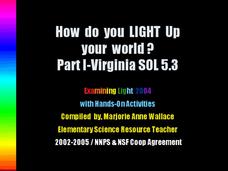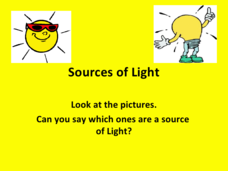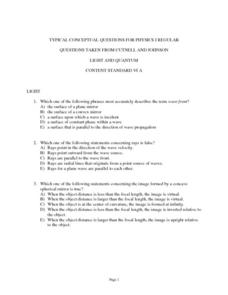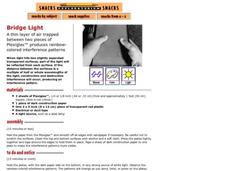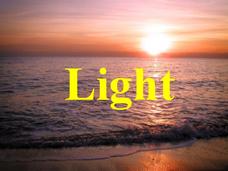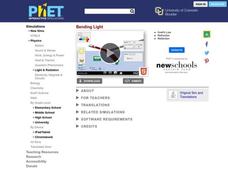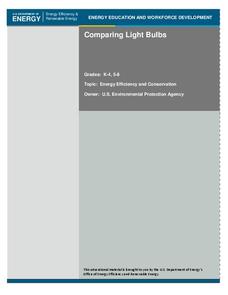Curated OER
How Do You Light Up Your World?
A fabulous presentation on light is here for you. In it, learners view slides which cover many important concepts of light. They understand exactly what light is, what the main sources of light are, what opaque, transparent, and...
Curated OER
Sources of Light
In pairs, learners will consider and discuss each of the provided slides to determine which objects are a source of light. Items include, but are not limited to, lamps, windows, pencils, mirrors, and the sun; these items are great for...
Curated OER
On The Light Side
Kindergartners identify different sources of light in a science activity. They view pictures of a flashlight, a match, and a lamp, among others, and color the part of the picture that creates light. A science activity prompts them to...
Curated OER
How Do You Light Up Your World?
A tremendous presentation on the properties of light. Young scientists are treated to slides which share a lot of fascinating information about light. This impressive PowerPoint is filled with great photos, graphics, and discussion...
Stanford University
Evaluating Historical Sources on Juana Briones
Most have never heard of Juana Briones, the incredible woman who came to own property and divorce her husband in 1850s California. Yet, her relatively unknown life reflects the historical dynamics of the American West, particularly those...
Curated OER
Typical Conceptual Questions for Physics I - Light and Quantum
This is a stellar overview of everything light and quantum! There are 30 multiple choice questions, none of them requiring any mathematical computation. There are a few diagrams to analyze: light rays striking reflective and refractive...
Exploratorium
Bridge Light
An illuminating activity demonstrates how interference of light waves creates a pattern. Using Plexiglas™ and construction paper, participants see rainbows appear as they twist or press against the plastic plates. After the activity, you...
Curated OER
Light
Here is a stellar slide show for illuminating middle schoolers' minds on the topic of light! An interactive slide allows viewers to sort light sources by whether or not they are man-made. More objects are displayed and learners discover...
Curated OER
Dependence of Light Intensity on Distance
Hopefully you have a sensor interface for your physics class to use with graphing calculators when collecting data with a light sensor. If so, read on. Use this resource for learners to predict and then test whether or not the intensity...
Curated OER
How Light Can "Bend"
Examine the properties of light with a fifth grade science experiment. Pupils find out how light bounces off the surface of a mirror, as well as how a periscope works. For the science investigation part, kids build their own periscope...
Curated OER
Sources of Energy
Fifth graders take a close look at how energy changes from one form to another within their surroundings. They also study the ten different sources of energy and determine which are renewable and which are non-renewable. This seven-page...
Curated OER
Shadows & Light, Science & Puppetry
Lights, shadows, action, and inquiry await your artistic scientists. They explore the way light travels, absorbs, reflects, and transmits through shadow play. They create folktale-inspired shadow puppets, explore the science of light,...
PHET
Bending Light
Different colors of the spectrum travel at different speeds through media, causing them to refract at different angles—which allows humans to see their colors. Through a simulation, pupils see how air, water, and other media bend light....
Curated OER
Energy Resources: Where Are They and How Do We Get Them?
Future energy engineers visit several stations, each one dedicated to a different alternative source of energy. They describe how solar energy is converted into other forms of energy, the patterns of distribution of energy resources in...
National Gallery of Canada
Shadow Chasers!
Experiment with light and shadow with a photography lesson. Learners first view several artistic photographs. They then play with different levels of light and various objects, eventually putting together compositions and taking pictures...
Colorado State University
What's the Difference Between Blue Light and Red Light?
Finally, an electromagnetic spectrum lab that will get glowing reviews from your class! Explore the nature of light using red and blue LED sources and fantastic phosphorescent paper. Young scientists compare the effects of blue light...
Curated OER
Got Light!
Sources of light, and the reflection of light off of objects, are the focus of this brief and simple science learning exercise. Learners must trace the path that light takes which enables a boy to read a book. A suggested activity is to...
Huntington Library
Light in Painting
How do painters use and manipulate light in their artwork to give emphasis and establish mood and emotion? Pupils will analyze a few examples of landscape and portrait painting in order to explore the how light is used in art, and will...
Curated OER
Comparing Light Bulbs
An average home produces twice as many emissions as an average car. Teach your class how to reduce energy consumption by replacing standard incandescent light bulbs with compact fluorescent light bulbs. Perform an experiment to compare...
Curated OER
See the light
How do light and eyesight function? Read a brief passage explaining the phenomena of light and sight. Then have learners draw arrows showing how a boy in a room with a lamp would be able to see a chair. A mini-experiment suggestion is...
Curated OER
Light at Night
Portraying accurate light in a chalk drawing can be difficult. This useful PowerPoint provides fantastic guidelines to achieve good lighting perspective in a drawing. Three photo examples are provides on slides six, eight, and ten, to...
Roy Rosenzweig Center for History and New Media
Early English Settlements History Detectives
Young historians play the role of history detectives as they investigate some primary source texts and images related to the early colonization of America, The Jamestown Settlement, and the Mayflower Compact.
Curated OER
Can You See the Light?
Third and fourth graders use this instructional activity to help them draw their own version of a fully functioning circuit. They see the battery, the light bulb, and two wires with clips. They must draw the complete circuit, using these...
Carnegie Mellon University
Consumer Preferences in Lighting
What is a watt? This tongue-twisting, mind-bending question and others are answered through this activity on the different lighting options available. With the support of a PowerPoint, teach your physical science class about units of...
Other popular searches
- Light Sources
- Natural Light Sources
- Science and Light Sources
- Science Light Sources
- Childrens Light Sources
- Alternative Light Sources
- Man Made Light Sources
- Secondary Light Sources
- Chileans Light Sources
- Children's Light Sources
- Chilrens Light Sources
- Natural Sources of Light


